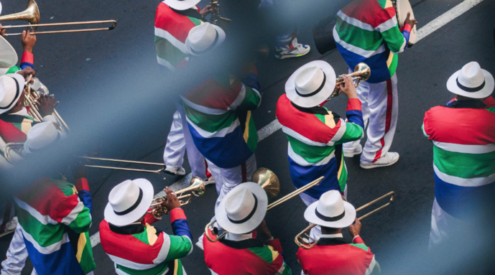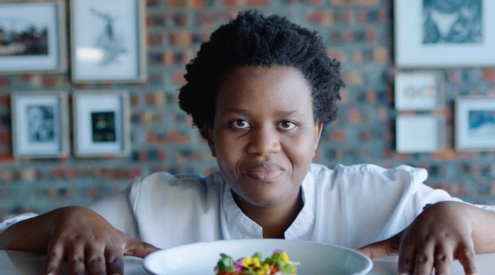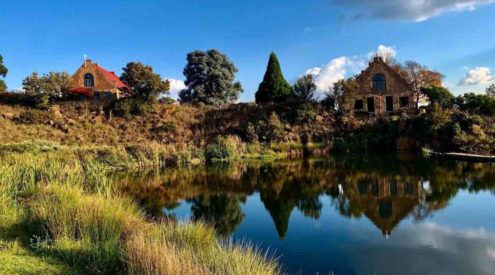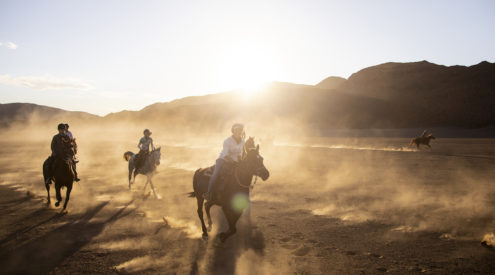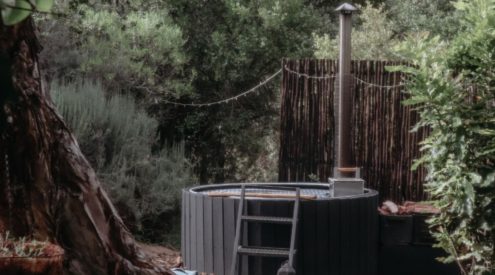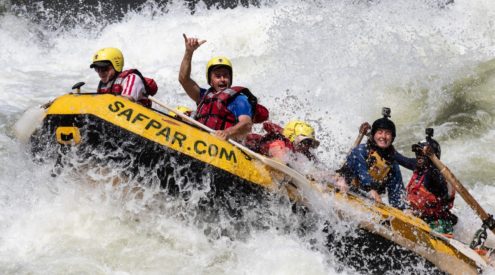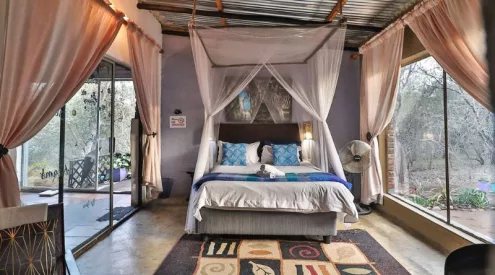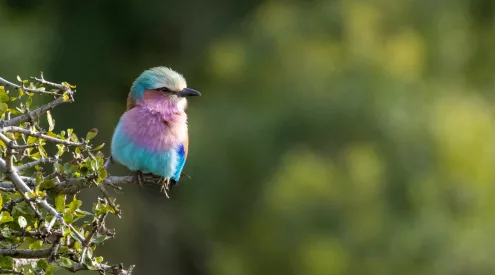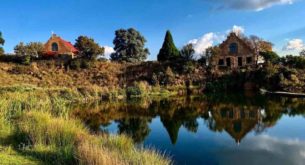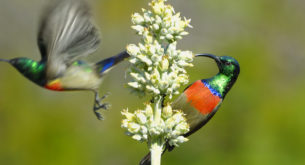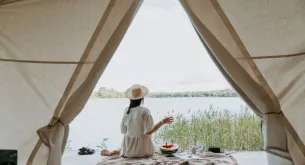Arthur C Clarke, co-writer of 2001: a Space Odyssey, predicted it; Covid lockdowns accelerated it: a bold new era of virtual travel. Di Tipping-Woods joined family members from five countries for a private virtual safari through greater Kruger, to see if it would soothe their bush-lus.
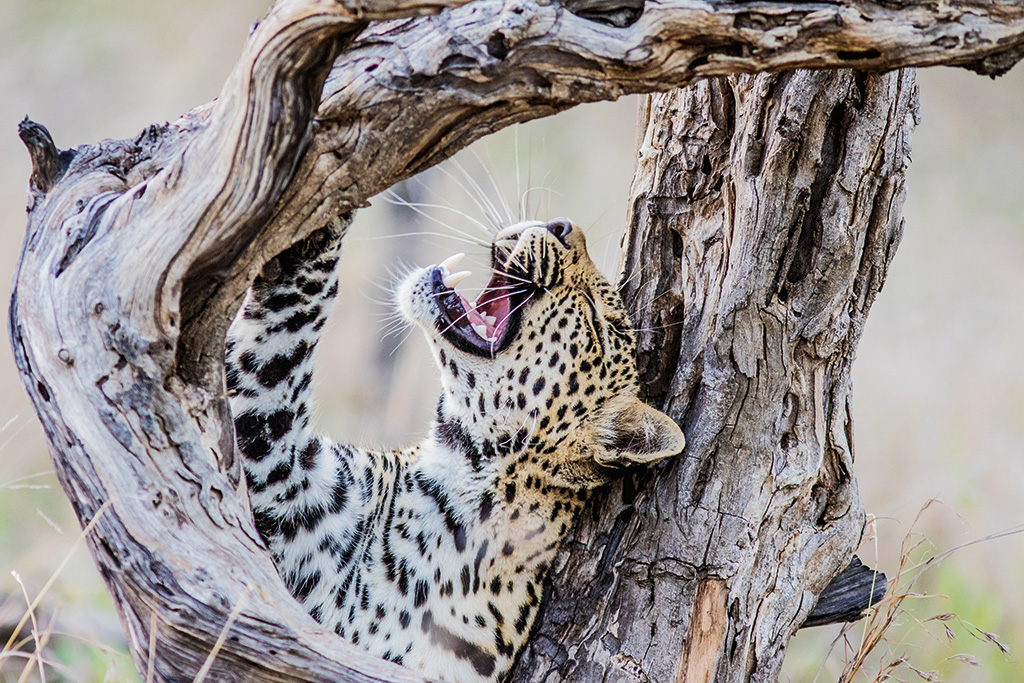
Relaxed leopard sightings are a highlight on any safari – virtual or otherwise.
Amsterdam, are you all with us?’
‘Affrimative. Heinekens are ready. Liv’s got her
verrekijker (binoculars).’
‘New Hampshire’s here.’
‘London, too.’
‘How’s the line in Zim?’
‘Good. Gin and tonics are lined up.’
‘Hot chocolate for Apeldoorn…’
The family WhatsApp group was firing fast, as we gathered around our screens in the USA, the Netherlands, Britain, Zimbabwe and South Africa. It was just before Christmas 2020, and we were all locked down in varying Covid restrictions. Much-anticipated trips had been cancelled and the distance between us had never seemed greater.

Brent Leo-Smith (left) and Bryan Joubert take Sanne and Bram Roerig behind the scenes in the Badger, their filming vehicle.
Meanwhile, in Pridelands, one of Kruger National Park’s associated private nature reserves, filmmaker and naturalist Brent Leo-Smith was heading out on a drive with cameraman Bryan Joubert to search for baby impalas, elephants and, if they were lucky, leopards or wild dogs. In the control room on the reserve, Painteddog.tv’s Wium Dörnbrack cued the music: ‘three, two, one…’
‘It’s a beautiful afternoon here in Pridelands…’ Brent was live. For the next two hours, we were bumping over dirt roads with him in the Badger, his modified Suzuki, on a reality-defying virtual game drive through the bush.
‘This is so much cooler than I expected,’ typed my 12-year-old nephew John, who was bundled up in a freezing New Hampshire with his iPad.
‘I can almost smell the bush,’ typed my sister-in-law, Simone, from a cold and wet Amsterdam.
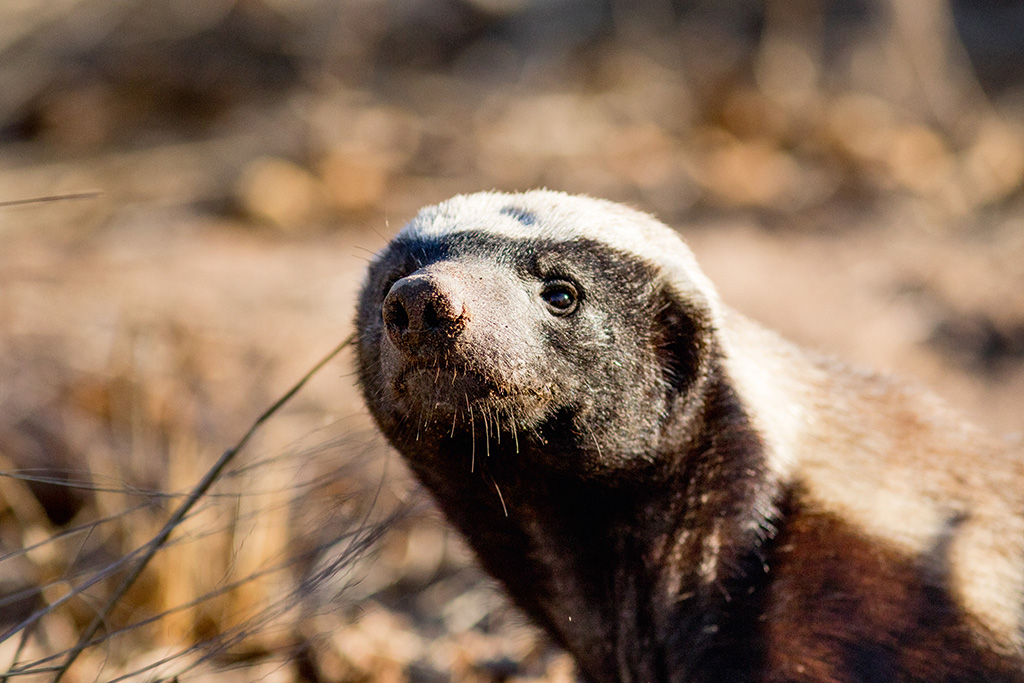
Painteddog.tv’s first filming vehicle was named after the fierce and tenacious honey badger
The idea of broadcasting from the bush isn’t new. There are more than 17 000 sites globally where live webcams give people an intimate view of the wild. The first of them, Africam, launched in 1999, sending static snapshots of the bush taken at 30 second intervals, to screens around the world. During months of lockdown in 2020, global interest in virtual safaris exploded.
In June 2020, Painteddog.tv launched the world’s first private African virtual safaris for small groups of paying guests. Our far-flung family just had to co-ordinate diaries across time zones, pay for our seats and click the link to our drive at the appointed hour.

Simone Roerig-Zijlstra and her daughter Liv (four) watching live from a chilly Amsterdam.
Big Five sightings at Pridelands are less prolific than at other reserves, including those on WildEarth TV, Graeme Wallington’s pioneering 24/7 tv channel that started broadcasting from the Sabi Sands in 2007 (Brent was previously a presenter on WildEarth). Pridelands only dropped its fences with Kruger in 2017, ‘so it still feels like a bit of an undiscovered paradise,’ said Brent, as we headed towards a spot called Pixie Pan, to look for leopards.
Rapidly developing broadcast technology and fast Wi-Fi mean new possibilities are opening in the live safari space all the time, something sci-fi legend Arthur C Clarke anticipated back in 1977.
‘He [Clarke] was speaking at a celebration of the centenary of the invention of the telephone, and made several wide-ranging predictions about the future of communications,’ says media professor Ian Glenn, who is investigating the history of wildlife documentary filmmaking for an upcoming book. In this address, Clarke predicted the rise of ‘personalised television safaris’, with ‘instant feedback from the viewer to cameraman’.

John and Christopher Bakker transfixed in Exeter New Hampshire, USA
‘How nice to be able to make a trip up the Amazon, with a few dozen unknown friends scattered all over the world, with perfect sound and vision, being able to ask your guide questions, request close ups of interesting plants or animals – in fact, sharing everything except the mosquitos and the heat,’ Clarke expounded.
We weren’t in the Amazon but we were living Clarke’s dream in the greater Kruger, chatting to Brent via YouTube chat and WhatsApp as he navigated the combretum woodlands. Having guided all over Africa, Brent knows a lot but it’s his passion that viewers connect with. ‘That is just gorgeous!’ he enthused, as Bryan zoomed in on a violet-backed starling. Soon the kids were bombarding him with questions.
‘What’s your favourite bird?’ yelled four-year-old Bram, delighted when Brent replied that he has many special birds but in the greater Kruger, he likes African hawk eagles and white-throated robin chats the most.

On virtual safari, Brent makes sure guests get up close and personal with the little things – like this golden orb spider.
‘Ik heb nog een vraag voor de man (I have another question for the man),’ yelled my niece Liv in Amsterdam, as though the screen wasn’t there.
My brother, William in London, was a little more reflective: ‘I really, really miss this. I can’t believe how I used to take it for granted,’ he typed.
We watched a purple-tongued giraffe delicately pluck shoots off a knobthorn, then examined the exoskeleton of a scorpion. ‘It’s made of chitin, which is similar to the shell of a shrimp,’ Brent explained. My daughter Sanne asked if he’d been stung by a scorpion (yes), then if he has a dog (he does), and then if there are too many elephants in Kruger. ‘I personally believe that there aren’t, and with the transfrontier parks and the associated private nature reserves, as well as new developments in Mozam- bique, the elephant population has space to expand its range,’ he answered.

The ability for broadcast cameras to zoom in close means
virtual safari guests can practise their own bird identification – this bright fellow is a male red-headed weaver.
On a private virtual safari, there are usually only eight to 12 guests, so every question gets attention. ‘We talk about whatever you want – hunting, poaching, ethics. We don’t shy away from the issues,’ said Brent. It’s a point of pride as much as principal that they don’t pander to armchair conservationists.
Guests respond to this tailored, authentic experience, forging bonds with their guide, just like guests on ‘real’ safaris. They also start to care about the wildlife through repeat sightings, as people want to know how an animal’s story unfolds over time, noted Glenn.
This has some inherent risks. Brent lived through some controversial incidents (like a leopard killing a domestic dog) before leaving WildEarth.tv in 2019. There are likely to be more
unscripted moments in his future but these are ‘an opportunity to educate people,’ says Brent.

Wium
Dörnbrack (left) and Brent Leo-Smith in the Painteddog.tv control room on Pridelands.
Painteddog.tv is evolving its vision of the future of wildlife filmmaking with each broadcast. ‘I love how real the experience is. I can’t watch most wildlife documentaries because they make stuff up,’ said Brent, referencing his wild childhood in South Africa’s Phinda Private Reserve. ‘I think most wildlife filmmakers start off trying to tell the truth but there’s a lot wrong with the industry, like the fact that it’s often western-centric. We have incredibly talented and qualified Africans. We should be telling our own stories,” he feels.
Increasingly, the stories he wants to tell are the conservation ones, delivering live conservation experiences – wild dog captures, elephant collaring and rhino dehorning – to guests all over the world.
Is this perhaps a low-impact way to fund conservation work, and even generate funds for remote areas with little tourism infrastructure? ‘It’s becoming a huge focus for us,’ says Brent. ‘We push a lot of boundaries and it doesn’t always work but we want to genuinely do good for conservation.’
It all pivots on the technology. Wium has assembled a robust kit in-house that fits into a standard car boot. But it’s continuously evolving, and they’re looking into military technologies now.

Elephants provide plenty of entertainment for viewers. Bryan
Joubert (left) and Brent Leo-Smith spend some time with a young bull.
Two hours flew by and as the sky caught fire, Brent said goodbye. We didn’t find the leopards at Pixie Pan. But it’s this ‘willingness to see frustration and unfulfilled hopes as part of authentic pleasure…’ that makes a virtual safari a success or not, noted Glenn.
‘This was so special for us, the best gift. I really feel so relaxed,’ typed my sister, Theresa, from the USA.
‘What a great way to be together in a pandemic,’ said my mom, Brigid, from Bulawayo in an IM.
The last message was from my father-in-law, Roel, in Apeldoorn: ‘The drive was great. We cannot wait to be in the bush with you all again soon.’
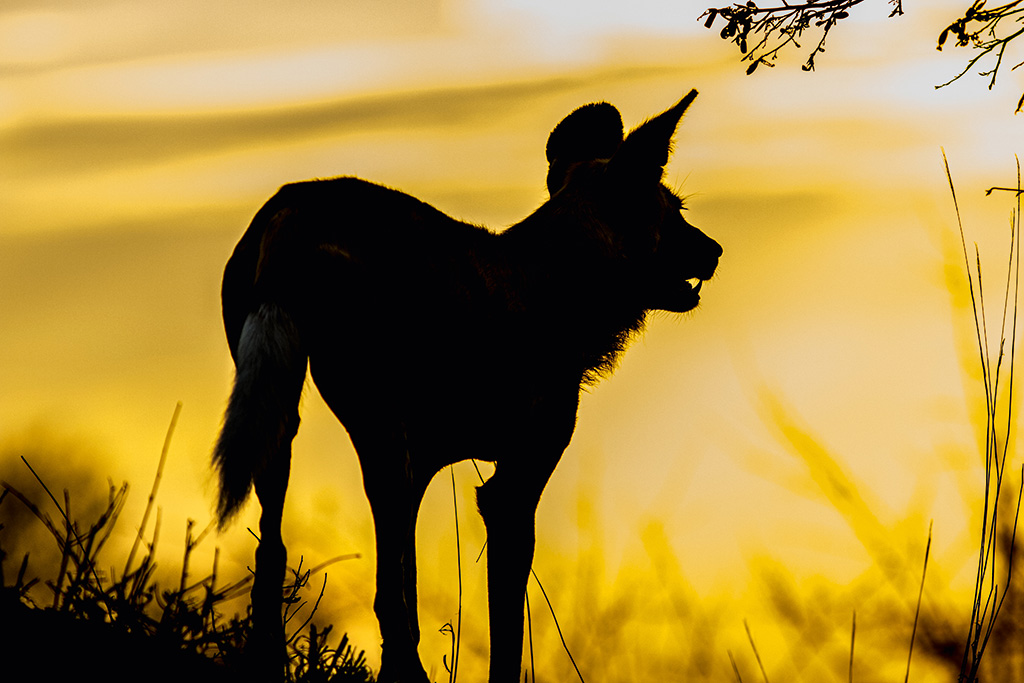
Wild dogs are nicknamed ‘pained dogs’ – hence the name of this virtual safari company.
‘Trip’ Planner
A seat costs R600 – fair since the guide’s time and the fuel are the same as on a ‘real’ safari. Booking an exclusive drive for R7 500 is cost effective for families or groups. Or buy a voucher to treat friends or relatives stuck overseas.
Check out Painteddog.tv to see what else the crew gets up to. You can become a patron and access exclusive content via patreon.com/PainteddogTV.
Pros of doing a virtual safari
Watch from anywhere with an internet connection
Build a relationship with a professional wildlife guide without having to physically travel.
Get viewers to care about more than just the Big Five which is typically documented on TV.
Promotes conservation ideals while reducing environmental pressures and carbon footprints on wilderness.
Live broadcasts of conservation-related events can help fund conservation and benefit communities in remote areas, or areas that have lost their tourism revenue.
The experience can stimulate authentic interest in the real thing, especially among children.
The range of destinations is growing all the time.
Cons
It’s just not the real thing.
Other virtual safaris
WildEarth.tv brings twice-daily and interactive safaris from various reserves in greater Kruger, as well as &Beyond’s Ngala Private Reserve, Thornybush, Pridelands, Tswalu and the Mara Conservancy. wildearth.tv.

Coming Soon
• Augmented reality, 3D experiences and virtual reality experiences such as Oculus Rift or an app like Google Cardboard.
• Collaborations. Do you need a gin delivery for your virtual safari?

